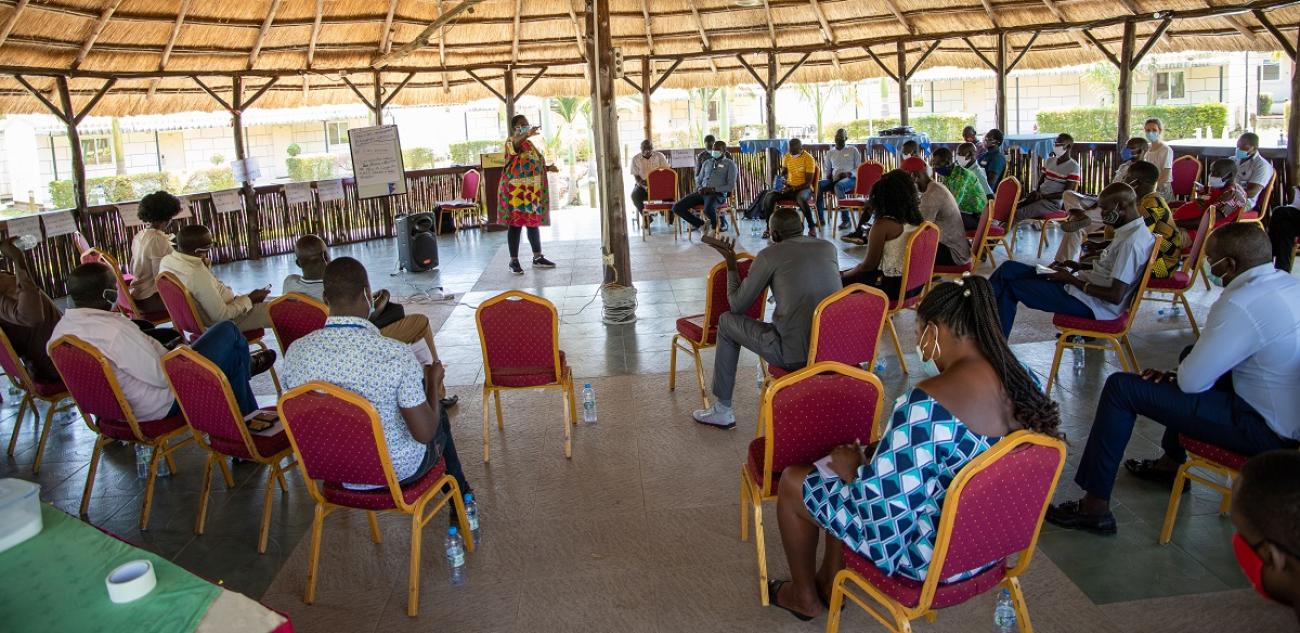UNOPS and IOM in partnership with the Government of South Sudan have started the implementation of the USD 45m Enhancing Community Resilience and Local Governance Project (ECRP). The project aims to address immediate needs for basic services throughout the country.
Funded by the World Bank, International Development Association (IDA), ECRP will cover about one fourth of the country, geographically, benefitting an estimated 630,000 people. In addition to the 10 counties selected for ‘quick wins’.
The Quick wins are sub-projects that were committed to be delivered during the Local Government and Service Delivery Project (LGSDP), which was implemented between 2014-2019. These sub-projects now are main components of the ECRP as foundations for local institutions strengthening in South Sudan. The ECRP will scale up these efforts, with a focus on conflict-affected and vulnerable areas. The project will support around 10 vulnerable counties in South Sudan, identified through the World Bank’s Vulnerability Index. It will focus on those areas that were heavily conflict affected, food insecure, exposed to natural hazards, and facing increased demand for basic services due to high concentration of returnees. The project will address the needs of 630,000 people approximately 50 percent of whom are women, across 10 states, 20 out of 79 counties, who are expected to directly benefit from project investments and support.
“ECRP will improve the provision of basic service delivery, particularly in vulnerable areas that were affected by the conflict, high concentration of returnees, and natural hazards such as flood. The project will also contribute to social cohesion among different groups in our country.” said Hon. Clement Khamis, Chairperson of the Local Governance Board.
The project has secured endorsement from the relevant government authorities at the national and state levels.
“The World Bank, UNOPS and IOM are partners of choice to the government of South Sudan and Central Equatorial State in particular,” said Hon. Emmanuel Adil Anthony, Governor of Central Equatoria during the ECRP introduction meeting at the Governor's office on December 9, 2021. He stated that the government will continue to support the project in consultation with the relevant line ministries, especially in the Central Equatorial State.
A project MoU was signed with the Ministry of Finance and Planning. A Project Steering Committee and National Technical Working Group have been established to provide oversight to the project. These are chaired by Under Secretary and the Director General respectively of both the Ministry of Finance and Planning and with membership from relevant Ministries such as local Government Board (LGB); Ministry of Gender, Child, and Social Welfare (MoGCSW); andSouth Sudan Relief and Rehabilitation Commission (SSRRC).
“UNOPS combines its strong Infrastructure expertise by applying a systematic community engagement approach that will see the project involve all levels of the formal and community institutions from the National through to the Payams and Bomas in consultative and inclusive processes to effectively deliver the project to meet the needs and aspirations of the people of South Sudan. UNOPS is grateful for the trust and confidence the Government of South Sudan has placed on it and its implementing partner the IOM, said Peter Mutoredzanwa, UNOPS Country Director and Representative to South Sudan.
“IOM is very proud and grateful to have been chosen as one of the two UN agencies to implement this project. While there is no question that there will be a continued need for emergency humanitarian assistance in South Sudan, it is critical for the future of the country that resources are increasingly allocated to projects like this, which focus on improving resilience and services at the community-level. This, together with continued peace and a reduction in violence, is the best way of ensuring a future where people will no longer need to rely on aid for their survival. IOM is committed to use its grassroots-level presence across the country, the knowledge and expertise of its teams on the ground to, together with the Government of South Sudan, the World Bank and UNOPS, ensure that this project will be a success” said Peter Van der Auweraert, IOM South Sudan Chief of Mission.
The International Development Association (IDA) is the World Bank’s fund for the poorest. Established in 1960, it provides grants and low to zero-interest loans for projects and programs that boost economic growth, reduce poverty, and improve poor people’s lives. IDA is one of the largest sources of assistance for the world’s 76 poorest countries, 39 of which are in Africa.
















